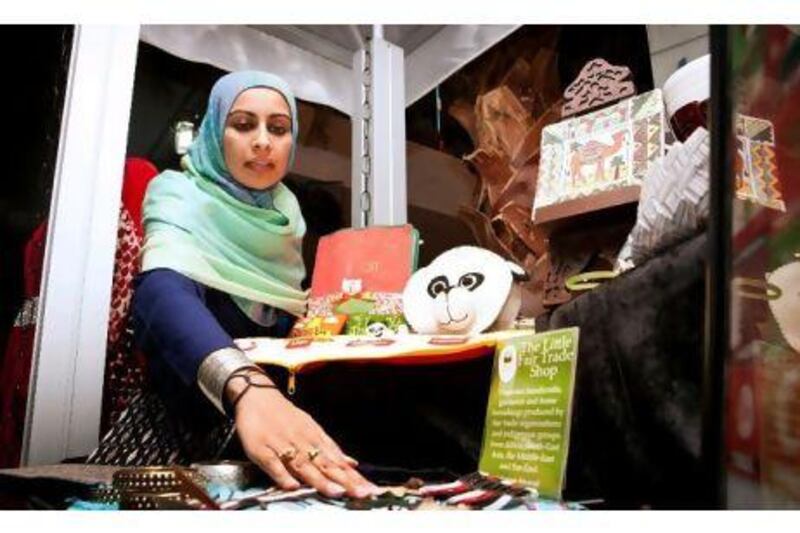There are plenty of markets and street fairs popping up throughout the Emirates, although not every entrepreneur standing behind a booth is in it exclusively for personal profit.
At the recent launch of Masdar City's first street fair in Abu Dhabi, two local women were hawking accessories and other items to bring in revenue to help workers in developing countries.
"Rents are so high here, I can't afford a shop," says Sabeena Ahmed, the founder of The Little Fair Trade Shop, a roaming business that displayed its wares at the Masdar City fair last weekend. It was also open at the Arabian Travel Market exhibition in Dubai last week. "It's difficult," she adds. "Financing a small business is hard."
What makes it even harder is that Ms Ahmed's main goal is to provide low-income artisans from developing countries a living wage for their work. She does this by selling fair trade-certified products, which means no child labour has been involved and items include jewellery made from recycled glass and plates crafted from sand that get sourced from such countries as Jordan, Egypt, Afghanistan and Palestine.
But Ms Ahmed makes it clear her efforts aren't about being charitable. "I really need to get across this isn't a charity," says Ms Ahmed, who runs her stand each weekend at the Covent Garden Market in Dubai and also recently popped up at the Womad music, arts and dance festival in the capital.
"It's about a highly skilled person who wants to earn a decent living and support their family," she says. "It is my humble aim to educate people about fair trade artisans and groups by promoting the principles of a living wage, self-reliance, environmental sustainability and self-respect for all."
While Ms Ahmed's business has helped other workers earn a living, and maybe even encouraged a few to spin-off as entrepreneurs themselves, she stops short from calling her business a success in the traditional sense. "Right now, to be honest, my accountant is not very happy with me. I've not made any profits," she says.
Neither has Susan Tabler, an Abu Dhabi resident who could also be found at a stall in Masdar City last weekend. She is technically a volunteer for the Philippine Community Fund (PCF), a UK-based charity that tries to improve the quality of life for the poorest of Filipino neighbourhoods.
Yet Ms Tabler says she has also been buying women's accessories made by workers in the Philippines from recycled products. These workers earn more than the minimum wage through a special "livelihood and skills training" programme set up by her charity.
She then resells the wares at cost to people in the Emirates at various street fairs, school sales and local women's groups, with proceeds being split between workers and PCF to help continue these types of programmes.
"PCF has created a materials recovery facility and has opened that up to the community [of] adults who are currently scavengers on dump sites," says Ms Tabler. "They go out to corporations, schools, hotels, hospitals and say to them 'please, if you have no recycling programme right now, we encourage you to recycle for a cause'."
Ms Tabler's latest collection includes purses made of metallic pop-top tabs, Dh65 (US$17.70) laptop covers made from snack wrappers and a matching necklace, bracelet and earrings pieced together from glossy magazines priced from Dh15 to Dh70.
There are even pairs of sandals made from tyres that can be carried away in a bag created from recycled material from airline seats.
Ms Tabler's business-savvy side also recently started to show when she approached a regional luxury hotel to donate the pull tabs from their pop cans.
"I'm scheduled to speak at their next town hall meeting and fill their staff in on what they're collecting," says Ms Tabler. "What we see easily tossed in the bin really isn't rubbish. We can turn this into cash - and salaries."





